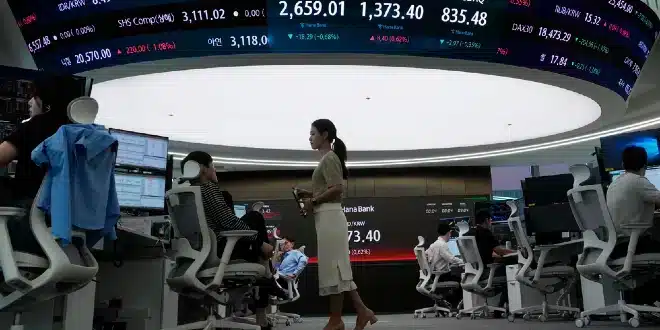Global stocks mostly declined on Monday after the release of a hotter-than-expected U.S. jobs report on Friday. Additionally, the euro fell following French President Emmanuel Macron’s dissolution of the National Assembly after far-right parties made significant gains in Sunday’s parliamentary elections.
The euro hit its lowest level in nearly a month, trading at $1.0766, down from $1.0778.
The election setbacks for incumbent parties caused a downturn in the region’s markets. Paris’ CAC 40 dropped 1.7% to 7,866.87, Germany’s DAX fell 0.7% to 18,425.26, and Britain’s FTSE 100 decreased 0.4% to 8,215.84 in early trading.
U.S. futures also showed declines, with the S&P 500 futures down 0.1% and Dow Jones Industrial Average futures down 0.2%.
Asian markets had mixed results. Tokyo’s Nikkei 225 index rose 0.9% to 39,038.16 after revised government data showed Japan’s economy contracted at an annualized rate of 1.8% in the first quarter, slightly better than the previously reported 2% decline. South Korea’s Kospi fell 0.8% to 2,701.17. Markets in China, Hong Kong, Australia, and Taiwan were closed for holidays.
On Friday, the S&P 500 fell 0.1%, the Nasdaq composite slipped 0.2%, and the Dow dropped 0.2%.
The U.S. jobs report for May showed employers added 272,000 jobs, exceeding economists’ expectations, although the unemployment rate rose for the second consecutive month. This robust jobs market has supported consumer spending and the broader economy but has also complicated the Federal Reserve’s decision-making on interest rates.
“We are back to the starting point where the Fed could hardly justify a rate cut when jobs data remains strong and inflation is not easing as fast as it should,” said Ipek Ozkardeskaya, a senior analyst at Swissquote Bank.
Following the jobs report, the yield on the 10-year Treasury rose to 4.43% from 4.29%, while the two-year yield, which closely tracks Fed expectations, increased to 4.89% from 4.74%.
Recent economic data suggested a cooling economy, with manufacturing contracting in May, lower-than-expected worker productivity, and a decrease in job openings.
Fed officials are expected to maintain current interest rates at their meeting later this week. After the jobs report, investors reduced bets on a rate cut in July, according to CME Group data.
Wall Street has been closely monitoring retailer earnings, which indicate consumers are cutting back on non-essential items. Persistent inflation is affecting consumer spending, especially for lower-income households.
GameStop, the troubled video game retailer at the center of the meme stock craze, fell 39.4% after reporting another quarterly loss and announcing plans to sell up to 75 million more shares.
In other markets, U.S. benchmark crude oil fell 18 cents to $75.35 per barrel in electronic trading on the New York Mercantile Exchange. Brent crude, the international standard, dropped 11 cents to $79.51 per barrel.
The U.S. dollar rose slightly to 156.86 Japanese yen from 156.83 yen.


